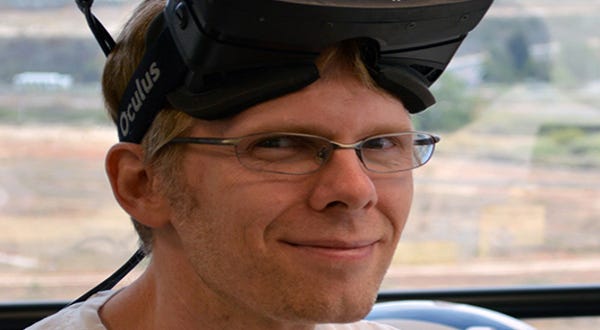Zenimax Accuses Carmack Of Theft In Move To Oculus
Lawyers at the ready
Today in the zany world of gaming news, John Carmack is a dirty rotten scoundrel - that is, if you subscribe to Bethesda parent company Zenimax's side of the story. The Elder Scrolls and Fallout publisher has laid claim to Oculus-related tech/code Carmack whipped up while still under Zenimax's umbrella at Doom dev id Software. Oculus and Carmack, of course, think it's a load of hogwash, but that hasn't stopped Zenimax from threatening to sue if Oculus doesn't sign on to some sort of licensing agreement. Hoo boy.
The Wall Street Journal first ran the story, and Engadget got official statements from both companies. First up, here's Zenimax with the accusation:
"ZeniMax confirms it recently sent formal notice of its legal rights to Oculus concerning its ownership of key technology used by Oculus to develop and market the Oculus Rift. ZeniMax's technology may not be licensed, transferred or sold without ZeniMax Media's approval. ZeniMax's intellectual property rights arise by reason of extensive VR research and development works done over a number of years by John Carmack while a ZeniMax employee, and others. ZeniMax provided necessary VR technology and other valuable assistance to Palmer Luckey and other Oculus employees in 2012 and 2013 to make the Oculus Rift a viable VR product, superior to other VR market offerings."
"The proprietary technology and know-how Mr. Carmack developed when he was a ZeniMax employee, and used by Oculus, are owned by ZeniMax. Well before the Facebook transaction was announced, Mr. Luckey acknowledged in writing ZeniMax's legal ownership of this intellectual property. It was further agreed that Mr. Luckey would not disclose this technology to third persons without approval. Oculus has used and exploited ZeniMax's technology and intellectual property without authorization, compensation or credit to ZeniMax. ZeniMax and Oculus previously attempted to reach an agreement whereby ZeniMax would be compensated for its intellectual property through equity ownership in Oculus but were unable to reach a satisfactory resolution. ZeniMax believes it is necessary to address these matters now and will take the necessary action to protect its interests."
So basically, Zenimax claims Carmack was working under an implicit agreement that the publisher - not Oculus or Carmack - had legal right to any tech given life by Carmack's wizardly hands, and apparently Oculus wunderkind Palmer Luckey even acknowledged that in writing. Oculus, however, believes Zenimax is telling the tallest of tales. Said the newly Facebook-owned virtual reality megalith:
"It's unfortunate, but when there's this type of transaction [Facebook's $2 billion purchase of Oculus], people come out of the woodwork with ridiculous and absurd claims. We intend to vigorously defend Oculus and its investors to the fullest extent."
John Carmack, meanwhile, took to Twitter with a statement of his own:
"No work I have ever done has been patented. Zenimax owns the code that I wrote, but they don't own VR."
So that's complicated. It does kinda sound like Zenimax might be onto something given that contracts often contain "all work produced by so-and-so at these times and places is the legal property of blah blah blah" clauses, but Carmack has suggested that that's not the case. Even so, it would be tremendously unwise to slug it out with Facebook's top-dollar legal team sans a rock-solid claim, so I don't imagine Zenimax is simply blowing hot air here. That's all speculative, though. It's incredibly tough to say what's actually happening behind closed doors.
I've gotten in touch with a few sources to try and find out more. I'll update this story if I learn anything.
Update: A few sources close to the situation (all of whom wished to remain anonymous) have claimed it is not uncommon for Zenimax contracts to contain a clause that gives Zenimax legal domain over employees' work, even if it's not necessarily related to the game project at hand. However, old guard employees sometimes get exceptions for side projects in other fields - music, for example. But even then, sources claimed that Zenimax's legalese is pretty restrictive.
